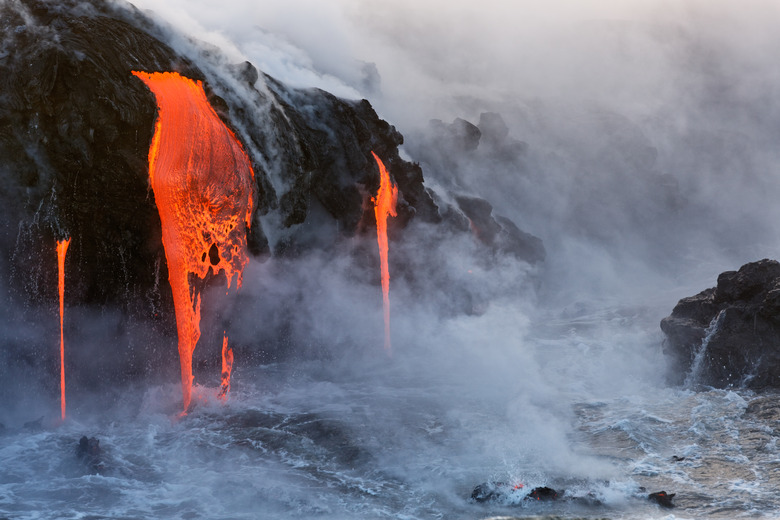What Are Some Of The Forces That Change Landforms?
The Earth's surface is constantly changing through forces in nature. The daily processes of precipitation, wind and land movement result in changes to landforms over a long period of time. Driving forces include erosion, volcanoes and earthquakes. People also contribute to changes in the appearance of land.
Erosion
Erosion
Erosion breaks down land and continents into smaller forms. Wind and water movement are common types of erosion. A boulder turns into sand after years of being hit by waves and particles. A mountain eventually becomes a hill when rain breaks it apart. Ocean waves and rivers push into the sides of cliffs, shaping the land. Erosion can also create new land. As rock and other sediment are carried away by the forces of erosion, they eventually settle elsewhere. New wetlands form at the mouths of rivers through this process.
Volcanoes
Volcanoes
Lava ejects onto the surface of the Earth through a volcano, which is a crack in the opening of the planet's crust. Lava pushes land up and hardens when it comes out of the Earth, and the resulting mountains are also called volcanoes. Shield volcanoes can shape the land for a long distance because the lava that comes out is fluid enough to travel far. Strato volcanoes are the tallest peaks formed by volcanoes. Their smaller counterparts are called cinder cones.
Earthquakes
Earthquakes
Earthquakes are caused by movement of crustal plates in the Earth's surface. Plates might grind against, or slide above or beneath one another. When the rocks break, they cause seismic waves to ripple away from the breaking point. Earthquakes emerge as a rapid shaking of the Earth, which can sometimes be felt by living organisms. The resulting force on the Earth's land includes faults, landslides, rifts and tsunamis. They can also cause damage to buildings and roads.
People
People
People contribute to the change of landforms through construction. Filling up a body of water forms new pieces of land. When people build rivers and lakes, they are also changing the land's shape. Diverting a river allows erosion to take place in an area that otherwise may not have experienced erosion. Building a dam can slow erosion in places because the water is inhibited from pursuing its natural course. Impermeable surfaces also contribute to land change because they stop the Earth's natural absorption of water.
Cite This Article
MLA
Doucette, Chrystal. "What Are Some Of The Forces That Change Landforms?" sciencing.com, https://www.sciencing.com/forces-change-landforms-8423296/. 13 March 2018.
APA
Doucette, Chrystal. (2018, March 13). What Are Some Of The Forces That Change Landforms?. sciencing.com. Retrieved from https://www.sciencing.com/forces-change-landforms-8423296/
Chicago
Doucette, Chrystal. What Are Some Of The Forces That Change Landforms? last modified March 24, 2022. https://www.sciencing.com/forces-change-landforms-8423296/
